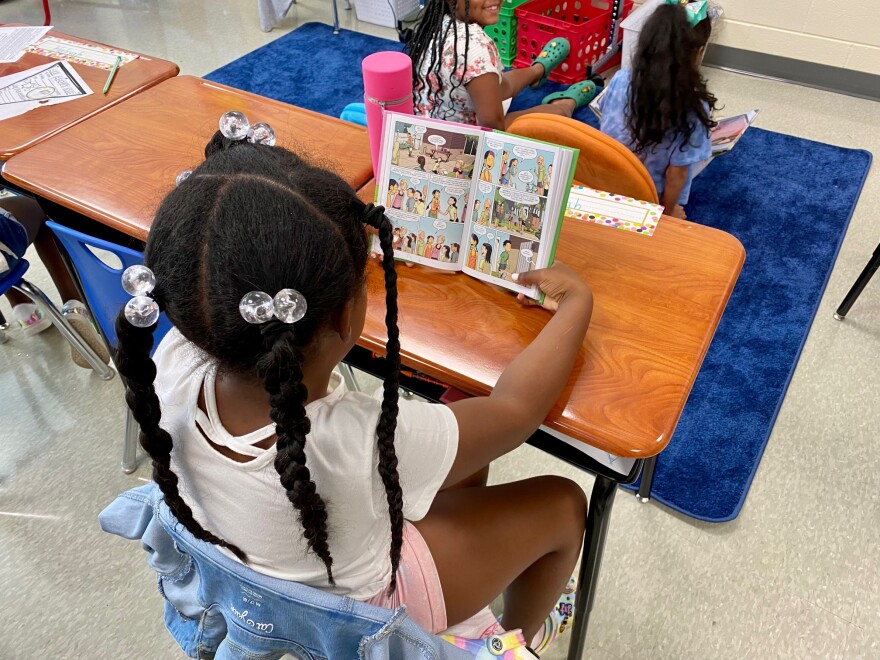The Charlotte-Mecklenburg Schools Board of Education returned Tuesday to what is arguably its most crucial challenge: dealing with dismally low reading scores for Black and Hispanic third-graders.
When the board identified that as one of its top goals in December, only 16% of those students had earned reading scores high enough to position them for success as they move forward. That came after a school year disrupted by remote and hybrid learning at the height of the pandemic.
But a year of in-person classes didn’t help, according to scores released earlier this month. At the end of last school year, the rate for Black and Hispanic third-graders fell to 13.5%. That’s based on what’s labeled the college-and-career-ready mark on state reading exams — a higher level than proficiency.
The board’s goal is to hit 36% for this year's third-graders and 50% by 2024. Board Chair Elyse Dashew said the stakes are high.
"They will achieve at a higher level than even before the pandemic if we as a board do our job well. And if we don’t do our job well our students will receive an education that is less than what they deserve," she said.
Tuesday’s progress review was the first since the new scores were released and since Interim Superintendent Hugh Hattabaugh took over. The board fired former Superintendent Earnest Winston in April, in part because members said academic progress was too slow.
The report presented to the board notes that the numbers translate to almost 1,563 children of color who fell short of the progress CMS would have needed to move toward the 2024 goal. It also notes that Black and Hispanic third-graders did move up slightly in the percent hitting the lower proficiency bar, from 24.5% to 29.1%.
The same trend occurred in the overall averages for all racial groups in third-grade reading, in CMS and statewide. North Carolina’s third graders nudged up from 45% to 46% rated proficient in 2022, but for the higher mark rates fell from 34% to 27%.
Students who took third-grade reading exams in 2022 were first graders when schools closed because of COVID-19 and had their second-grade experience disrupted by continued closings. They likely missed basic skills needed to reach third-grade reading goals.
A 25-page list of answers to board members' questions notes that last year's third graders started the year with weaker reading skills than prior classes. It says that among the students who started third grade in 2017 and 2018, almost 14% hit the college-career mark when the year began and about 32% hit it at the end of the year. For students starting in 2020 just over 9% hit the mark in beginning-of-year exams, and last year that fell to 3%.
Scores from this year's beginning-of-year exams aren't in yet. Hattabaugh said he hopes it's in the double digits, but said "at this point we can't be making excuses."
"The superintendent and the staff, we have to determine the how, the strategies to get the job done," he said.
Effective teachers and attendance
The report lists several strategies for improving outcomes in the current school year. They include:
- Assigning the most effective teachers to second and third-grade classes.
- Intervening promptly if students show struggles with academics, behavior or attendance.
- Providing professional development for educators based on student needs.
Hattabaugh said 94% of second and third grade classrooms have licensed, certified teachers. He said he won't be able to judge their effectiveness until the state provides ratings based on the 2022 test scores later this fall.
He said nationwide teacher shortages are making it tough to fill all jobs, and added that North Carolina’s cumbersome licensure system doesn’t help. In a response to board member questions, the staff notes that elementary teachers must take multiple stringent tests, along with licensing requirements that are difficult to complete in the time allowed.
"We need to look at the fact that when people are trying to come in from other states to hire, they walk away because of all the hurdles that are put in place with licensure," Hattabaugh said.
Hattabaugh said improving attendance is one key to helping children learn to read. He said social workers will contact families to offer support and encourage them to get their children to school. There will also be state-mandated warning letters sent as students approach 10 absences.
"And after that we’ll follow the state statutes and we’ll be addressing it to the district attorney’s office," he said.
In other words, parents could face criminal charges if their kids are chronically absent. Earnest Winston, Hattabaugh’s predecessor, had said prosecuting parents was an ineffective practice and had been suspended during the pandemic.
Learning from success
The report identifies two CMS elementary schools — Berewick Elementary in southwest Charlotte and Paw Creek Elementary in northwest Charlotte — where Black and Hispanic third graders made progress in hitting the reading mark. At Berewick 25% of Black third graders and 16% of Hispanic third-graders hit the college-ready mark. At Paw Creek 27% of Hispanic third graders and 17.5% of Black third graders reached that level.
The report says those schools adapted the standard reading curriculum to meet the needs of their own students, rather than following it to the letter. They provided planning time and support for teachers, expanded the time spent on reading basics for students who were falling behind and created “a culture of safety and caring,” the report says.
“The lessons learned from their gains will inform our strategic efforts moving forward to hopefully duplicate if not eclipse the gains they attained,” the report says.
Tuesday’s review was designed for board members to judge whether the staff has effective strategies in place and figure out what board-level support is needed. The board will look into strategies for improving performance on high school Math I exams at its next meeting.



